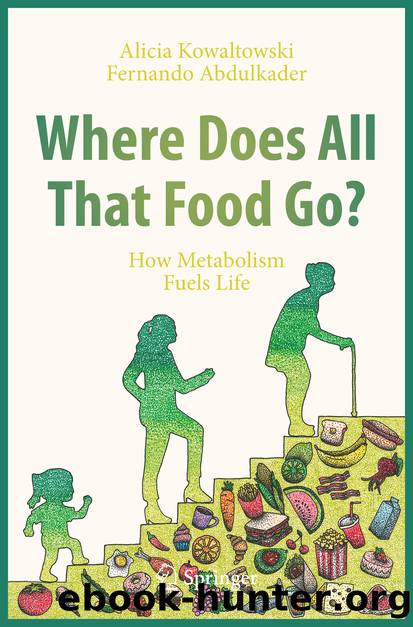Where Does All That Food Go? by Alicia Kowaltowski & Fernando Abdulkader

Author:Alicia Kowaltowski & Fernando Abdulkader
Language: eng
Format: epub
ISBN: 9783030509682
Publisher: Springer International Publishing
Amino acids from proteins you eat will circulate in your blood after meals, and can follow many different metabolic pathways, resulting in the production of different molecules. Many of these amino acids will be incorporated in proteins. Our body continuously produces proteins for the different functions they have, replenishing proteins that are old and dysfunctional, or creating new functional proteins for new roles within our cells. Building proteins requires amino acids as building blocks, and these amino acids frequently come directly from our diet and are taken up from the blood by our cells. In fact, building proteins in our body requires eating proteins, since amino acids cannot be produced from other types of molecules we eat.
However, the reality that we need to have amino acids as materials to build proteins does not mean that increasing the levels of amino acids in our diets will necessarily increase protein production. Delivering bricks at a construction site is necessary to build a brick wall, but not sufficient for building it. Likewise, eating amino acids is necessary to build protein , but not enough. The production of every individual type of protein is regulated in different manners, and although protein production in general is boosted by some metabolic hormones like insulin and thyroid hormones, the production of each individual protein needs other specific cell signals to happen.
For example, the proteins that make up our muscles are long fibrous structures that slide alongside each other to contract or extend a muscle. That is what makes you move. These proteins need amino acids to be made, just as every other protein , but unfortunately you will not beef up your muscles just by eating a beef steak, taking a whey protein supplement or ingesting any other source of abundant protein . Muscle growth requires signals within the muscle, such as those induced by exercise, for example. If you don’t have the signals but eat a whole lot of protein , the amino acids in the protein you ate will not go into your muscle. They can be incorporated into other proteins and, when in excess, stored as other molecules. What other molecules? If you guessed that the excess protein you eat typically ends up being stored as fat, you got it right. It is a sad but true metabolic fact that our bodies are very good at storing anything we eat too much of as fat.
This knowledge of course should make you question what all those protein supplements, that are sold supposedly to make your muscles grow, are good for. The truth is that whey protein supplements are a smart sales idea, that uses leftover protein from dairy industries that was previously used for animal feed. They are not necessarily bad for you (although there is some still inconclusive evidence they can increase kidney disease), but if you have a typical western diet , you probably have more than enough protein from your food, and adding a protein supplement powder will not make you build any more muscle than you already would build from your normal exercise.
Download
This site does not store any files on its server. We only index and link to content provided by other sites. Please contact the content providers to delete copyright contents if any and email us, we'll remove relevant links or contents immediately.
| Administration & Medicine Economics | Allied Health Professions |
| Basic Sciences | Dentistry |
| History | Medical Informatics |
| Medicine | Nursing |
| Pharmacology | Psychology |
| Research | Veterinary Medicine |
Periodization Training for Sports by Tudor Bompa(8250)
Why We Sleep: Unlocking the Power of Sleep and Dreams by Matthew Walker(6694)
Paper Towns by Green John(5175)
The Immortal Life of Henrietta Lacks by Rebecca Skloot(4571)
The Sports Rules Book by Human Kinetics(4378)
Dynamic Alignment Through Imagery by Eric Franklin(4206)
ACSM's Complete Guide to Fitness & Health by ACSM(4049)
Kaplan MCAT Organic Chemistry Review: Created for MCAT 2015 (Kaplan Test Prep) by Kaplan(3999)
Introduction to Kinesiology by Shirl J. Hoffman(3765)
Livewired by David Eagleman(3762)
The Death of the Heart by Elizabeth Bowen(3605)
The River of Consciousness by Oliver Sacks(3598)
Alchemy and Alchemists by C. J. S. Thompson(3510)
Bad Pharma by Ben Goldacre(3420)
Descartes' Error by Antonio Damasio(3270)
The Emperor of All Maladies: A Biography of Cancer by Siddhartha Mukherjee(3142)
The Gene: An Intimate History by Siddhartha Mukherjee(3091)
The Fate of Rome: Climate, Disease, and the End of an Empire (The Princeton History of the Ancient World) by Kyle Harper(3055)
Kaplan MCAT Behavioral Sciences Review: Created for MCAT 2015 (Kaplan Test Prep) by Kaplan(2980)
